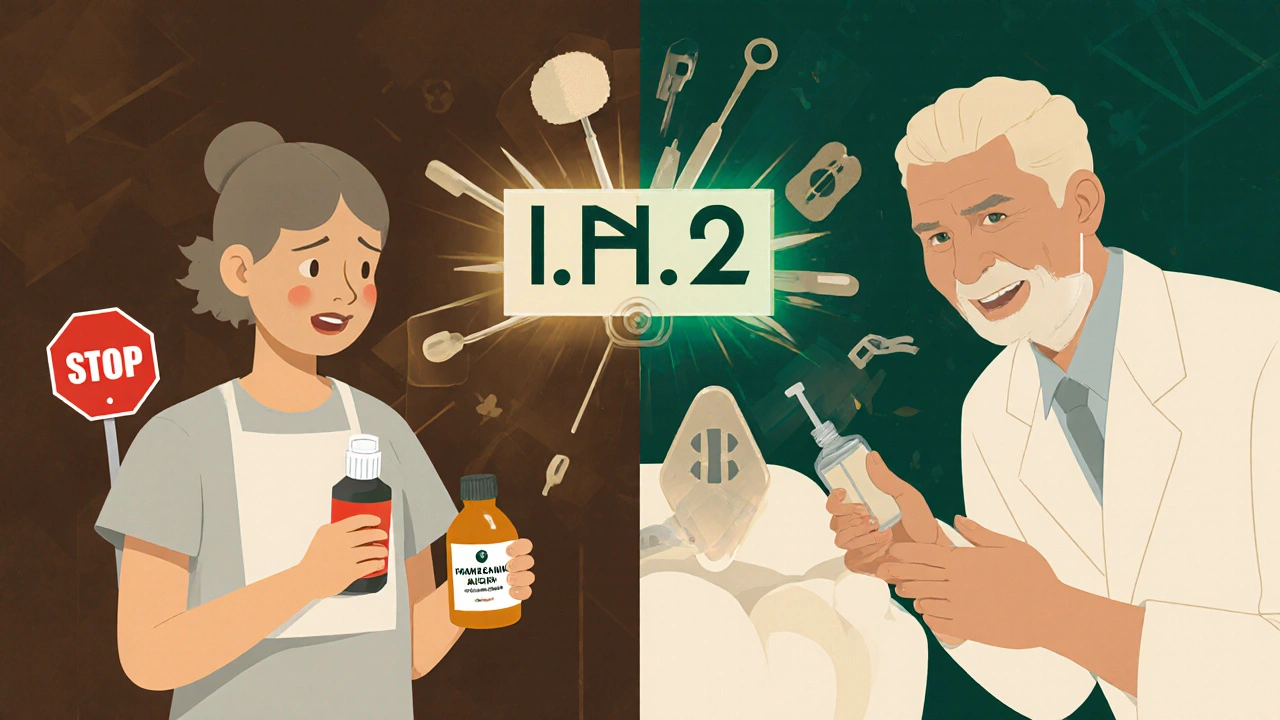Dental Procedures on Blood Thinners: What You Need to Know About Bleeding Risk and Safety
 Nov, 23 2025
Nov, 23 2025
Why You Don’t Need to Stop Your Blood Thinners for Most Dental Work
Many people on blood thinners panic when their dentist mentions a cleaning, filling, or extraction. They worry about bleeding too much. But here’s the truth: for most dental procedures, you should keep taking your blood thinner. Stopping it can be more dangerous than letting it run its course.
Back in the 1990s, dentists routinely told patients to pause their anticoagulants before any procedure. That’s not the case anymore. Research from the American Dental Association (ADA), Stanford Health Care, and the Scottish Dental Clinical Effectiveness Programme (SDCEP) all agree: the risk of a clot forming is far greater than the risk of a little extra bleeding.
Think about it. A tooth extraction isn’t open-heart surgery. You’re not losing a pint of blood. Most patients on warfarin or DOACs (direct oral anticoagulants) experience only minor, easily controlled bleeding - if any. In fact, the University of Texas Health Science Center says that even with full therapeutic anticoagulation, the chance of any bleeding complication is only around 5%.
How Dental Procedures Are Classified by Bleeding Risk
Not all dental work is the same. The key is matching your procedure to your medication and your body’s risk level. Experts group procedures into three clear categories:
- Low-risk procedures: Routine cleanings, X-rays, study models, and simple fillings. These don’t cut deep into tissue. You don’t need to stop your meds. Not even for a day.
- Low-moderate risk: Scaling and root planing (deep cleaning), root canals, crowns, and bridges. These involve more tissue manipulation but still don’t require stopping blood thinners. Most patients handle these just fine.
- Moderate risk: Extracting one to three teeth, gum surgery, or removing a single impacted tooth. This is where things get a little more careful - but even here, stopping your medication isn’t automatic.
For example, if you’re on warfarin and need a single tooth pulled, you’re not automatically told to hold your dose. Many dentists will proceed as normal, especially if your INR (a blood test that measures clotting time) is below 3.5. That’s the standard cutoff for most moderate procedures.
What Your INR Level Means for Your Appointment
If you take warfarin, your doctor or anticoagulation clinic likely checks your INR every few weeks. That number tells your dentist how thin your blood is.
- INR below 3.5: Safe for almost all dental work, including extractions. No changes needed.
- INR above 3.5: Your dentist will consult your prescribing doctor. They might delay the procedure or adjust your dose - but only if absolutely necessary.
- INR above 4.0: This is a red flag. Even a simple cleaning could carry higher bleeding risk. Your doctor may temporarily lower your dose.
Here’s what you need to know: INR isn’t the only factor. Age, kidney function, liver health, and other medications all matter. A 75-year-old with kidney disease and high INR needs different handling than a 40-year-old athlete with stable warfarin levels.
Managing Blood Thinners: Warfarin vs. DOACs
There are two main types of blood thinners. How you handle them depends on which one you’re on.
Warfarin (VKA) - This older drug requires regular blood tests. For most dental work, you keep taking it. Only in rare cases - like multiple extractions or complex oral surgery - might your doctor suggest holding it for 3 to 5 days. Even then, it’s not guaranteed.
DOACs - These include drugs like apixaban (Eliquis), rivaroxaban (Xarelto), and dabigatran (Pradaxa). They’re now used in about 60% of new prescriptions. The big advantage? They don’t need regular blood tests. For low- to moderate-risk procedures, you typically just skip your dose on the morning of your appointment. If your procedure is scheduled for 10 a.m., you’d skip your 8 a.m. pill. That gives the drug time to clear from your system without leaving you unprotected.
For major surgery, your doctor might advise holding the DOAC for 24 to 48 hours. But again - you don’t decide this alone. Always check with your prescribing physician and your dentist together.

What Your Dentist Can Do to Control Bleeding
Even if you’re on blood thinners, your dentist isn’t helpless. They have tools to stop bleeding fast.
- Tranexamic acid mouthwash: This isn’t something you buy at the drugstore. It’s a special rinse made by a compounding pharmacy. You swish 10 milliliters for 1 to 2 minutes, spit it out, and repeat every 2 hours for the first 24 hours. It’s been shown to reduce bleeding by over 70% in anticoagulated patients.
- Pressure and packing: After an extraction, your dentist will pack the socket with gauze or a collagen sponge. You’ll be told to bite down firmly for 30 to 45 minutes.
- Stitches and cauterization: For more complex extractions, they may use sutures or a mild electric current to seal off blood vessels.
One big no-no? Don’t let your dentist pull two or three teeth in a row. It increases bleeding risk. Instead, space them out over two or three visits. It’s safer and less stressful.
Drugs That Make Bleeding Worse - And What to Avoid
Some common medications and supplements can turn a minor bleed into a big problem.
- NSAIDs: Ibuprofen, naproxen, aspirin - these are all anti-inflammatory drugs that also thin blood. If you’re on a blood thinner, stick to acetaminophen (Tylenol) for pain.
- Herbal supplements: Garlic, ginkgo, ginger, ginseng, fish oil - they all interfere with clotting. Stop them at least a week before any procedure.
- Certain antibiotics: Some, like fluconazole (used for yeast infections), can raise your INR if you’re on warfarin. Always tell your dentist what else you’re taking.
Don’t assume your dentist knows your full med list. Bring a printed list or a photo of your pill bottles to your appointment. Even if you think it’s "not important," it might be.
What to Do After Your Appointment
After a procedure, your mouth will feel tender. Here’s how to stay safe:
- Don’t rinse or spit for 24 hours. Swishing can dislodge the clot.
- Use cold compresses on your cheek if swelling happens.
- Eat soft foods. Avoid hot, spicy, or crunchy stuff.
- Watch for signs of trouble: If you’re bleeding for more than 2 hours despite pressure, or if you’re swallowing blood constantly, call your dentist immediately.
Most bleeding stops within minutes. But if you’re unsure, it’s better to call than to wait. Your dentist has a protocol for this - they’ve done it before.
Real People, Real Stories
It’s not just older adults on blood thinners anymore. A 28-year-old woman developed a pulmonary embolism after giving birth and now takes apixaban. A 32-year-old runner got atrial fibrillation after a marathon and started rivaroxaban. A 25-year-old with Factor V Leiden had a blood clot during a flight and now needs lifelong anticoagulation.
These aren’t rare cases. They’re becoming common. And they all need dental care. The good news? With the right planning, they get it - safely.
When to Talk to Your Doctor Before Your Dental Visit
You should always check with your doctor if:
- You’re on more than one blood thinner (like warfarin plus aspirin).
- You have kidney or liver disease.
- Your INR has been unstable lately.
- You’ve had a clot or stroke in the past year.
- You’re scheduled for multiple extractions or oral surgery.
Don’t wait until the day of your appointment. Call your doctor at least 5 to 7 days ahead. Ask: "Should I hold my blood thinner for my dental procedure?" And get their answer in writing if possible.
Bottom Line: Keep Taking Your Meds - Unless Your Doctor Says Otherwise
For over 90% of dental procedures, you don’t need to stop your blood thinner. The risk of a stroke, heart attack, or clot is much higher than the risk of bleeding. Dentists today are trained to manage bleeding safely. They have the tools. You just need to show up - and tell them exactly what you’re taking.
Don’t let fear keep you from cleanings or fillings. Delaying care leads to worse problems: infections, tooth loss, pain, and higher costs down the road. With the right approach, your dental health and your heart health can both stay strong.
Should I stop my blood thinner before a dental cleaning?
No. Routine cleanings are low-risk procedures. Stopping your blood thinner increases your risk of stroke or clot without reducing bleeding risk. Keep taking your medication as prescribed. Your dentist will use safe techniques to manage any minor bleeding.
Can I take ibuprofen after a tooth extraction if I’m on blood thinners?
No. Ibuprofen and other NSAIDs like naproxen can increase bleeding risk when combined with blood thinners. Use acetaminophen (Tylenol) instead for pain relief. Always check with your dentist or pharmacist before taking any new medication.
What if my INR is too high before my dental appointment?
If your INR is above 3.5 for a simple procedure or above 3 for a deeper one, your dentist will contact your prescribing doctor. They may temporarily lower your dose or delay the procedure. Never adjust your medication yourself. Always coordinate between your dentist and your doctor.
Do DOACs require special handling for dental work?
Yes, but it’s simpler than warfarin. For most procedures, just skip your DOAC dose on the morning of your appointment. For example, if your appointment is at 10 a.m. and you take your pill at 8 a.m., skip that dose. For major surgery, your doctor may advise holding it for 24-48 hours. No blood tests are needed.
How long should I wait after a tooth extraction before resuming my blood thinner?
If you skipped a dose for a procedure, restart your blood thinner the same day or the next morning, unless your doctor says otherwise. If you held your medication for several days, your doctor will give you specific instructions on when to restart - usually within 24 hours after the procedure, once bleeding is controlled.
Is it safe to get dental implants if I’m on blood thinners?
Yes, but it’s considered a moderate- to high-risk procedure. Your dentist will coordinate with your doctor. You may need to skip one or two doses of your DOAC or adjust your warfarin. The key is planning ahead - don’t wait until the day of surgery. A well-managed implant procedure has a high success rate even with anticoagulation.
Next Steps: What to Do Before Your Next Dental Visit
- Write down every medication and supplement you take - including over-the-counter pills and herbs.
- Check your latest INR result if you’re on warfarin. Bring the number with you.
- Call your prescribing doctor 5-7 days before your dental appointment. Ask if you should hold your blood thinner.
- Tell your dentist everything you told your doctor - even if you think it’s minor.
- After the procedure, follow the bleeding instructions exactly. If in doubt, call your dentist.
Managing blood thinners and dental care isn’t about fear. It’s about coordination. You’re not alone. Thousands of patients do this safely every day. With the right info and communication, you can keep your teeth - and your heart - healthy.
raja gopal
November 24, 2025 AT 03:59Samantha Stonebraker
November 26, 2025 AT 01:46Kevin Mustelier
November 26, 2025 AT 23:25Keith Avery
November 27, 2025 AT 13:47Luke Webster
November 29, 2025 AT 01:00Natalie Sofer
November 30, 2025 AT 20:39Tiffany Fox
December 1, 2025 AT 12:39Rohini Paul
December 1, 2025 AT 20:07Courtney Mintenko
December 2, 2025 AT 18:48Sean Goss
December 3, 2025 AT 16:59Khamaile Shakeer
December 4, 2025 AT 03:53